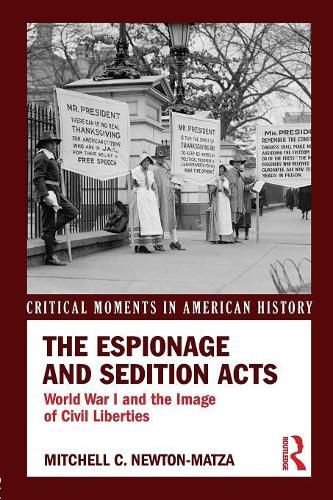Readings Newsletter
Become a Readings Member to make your shopping experience even easier.
Sign in or sign up for free!
You’re not far away from qualifying for FREE standard shipping within Australia
You’ve qualified for FREE standard shipping within Australia
The cart is loading…






The Espionage and Sedition Acts of 1917-1918 mark one of the most controversial moments in American history. Even as President Woodrow Wilson justified US entry into World War I on the grounds that it would make the world safe for democracy, the act curtailed civil liberties at home by making it illegal to speak out against the US participation in the conflict. Supporters of the Acts argued that these measures were necessary to protect national security and keep in check the perceived threat of radical activities, while opponents considered them an unjustifiable breach of the Bill of Rights. The conflict between government powers and civil liberties concretized by the Acts continues to resonate today.
The Espionage and Sedition Acts introduces students to this controversial set of laws, the cultural and political context in which they were passed, and their historical ramifications. In a concise narrative supplemented by primary sources including court cases, newspaper articles, and personal papers, Mitchell C. Newton-Matza gives students of history and politics a nuanced understanding of this key event.
$9.00 standard shipping within Australia
FREE standard shipping within Australia for orders over $100.00
Express & International shipping calculated at checkout
The Espionage and Sedition Acts of 1917-1918 mark one of the most controversial moments in American history. Even as President Woodrow Wilson justified US entry into World War I on the grounds that it would make the world safe for democracy, the act curtailed civil liberties at home by making it illegal to speak out against the US participation in the conflict. Supporters of the Acts argued that these measures were necessary to protect national security and keep in check the perceived threat of radical activities, while opponents considered them an unjustifiable breach of the Bill of Rights. The conflict between government powers and civil liberties concretized by the Acts continues to resonate today.
The Espionage and Sedition Acts introduces students to this controversial set of laws, the cultural and political context in which they were passed, and their historical ramifications. In a concise narrative supplemented by primary sources including court cases, newspaper articles, and personal papers, Mitchell C. Newton-Matza gives students of history and politics a nuanced understanding of this key event.